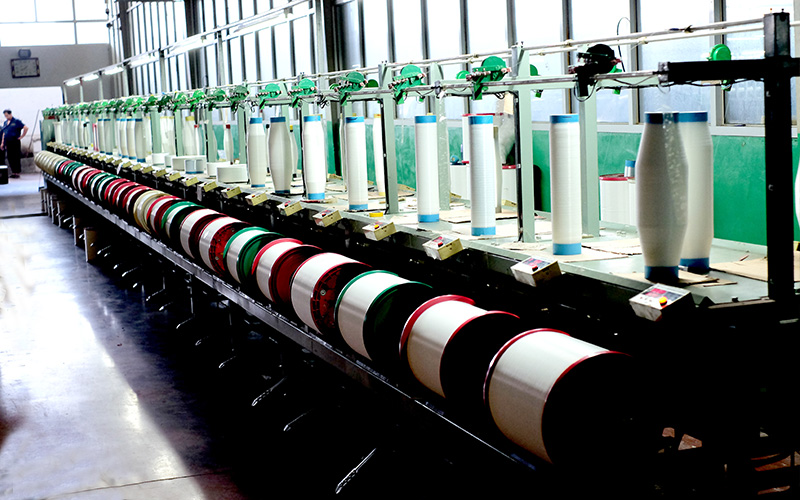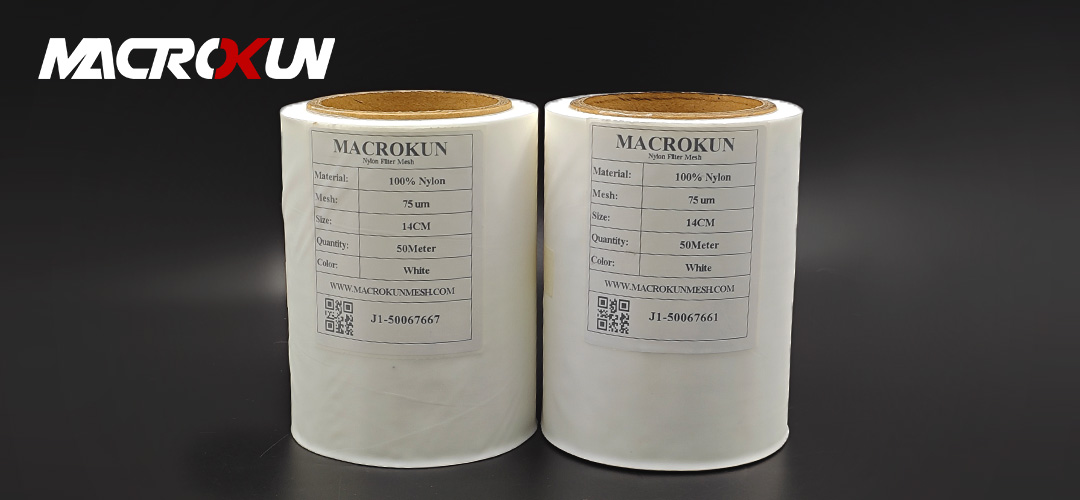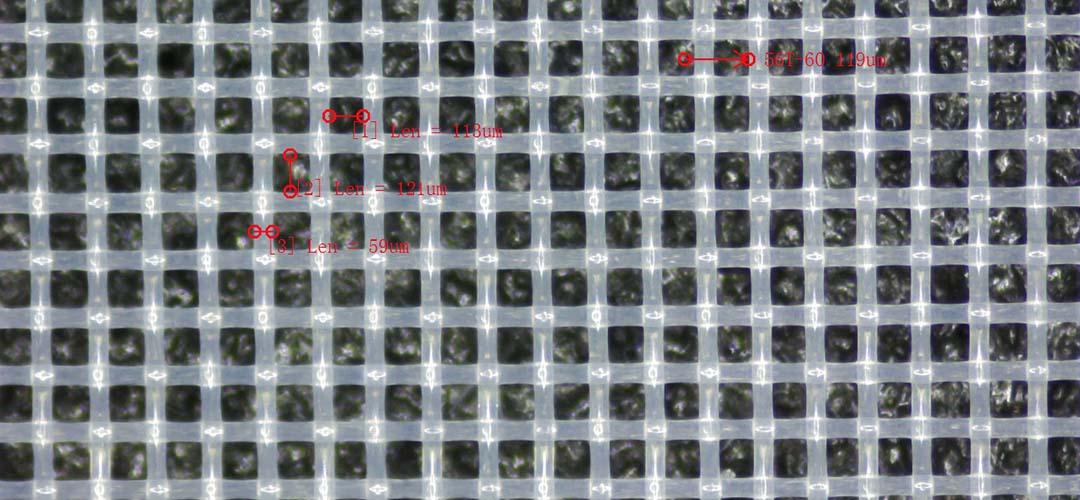Nylon mesh is a versatile material that has found numerous applications in various industries. One of its most significant uses is in filtration processes, where it is used as filter cloth. Nylon mesh filter cloth offers several benefits that enhance filtration performance, making it a popular choice for many businesses.
One of the key advantages of using nylon mesh for filter cloth is its excellent strength and durability. Nylon is known for its high tensile strength, which means it can withstand the pressure and stress of filtration processes without tearing or breaking. This durability ensures that the filter cloth can be used for extended periods without needing frequent replacements, reducing downtime and maintenance costs.
In addition to its strength, nylon mesh filter cloth also offers excellent chemical resistance. It can withstand exposure to a wide range of chemicals, including acids, alkalis, and solvents, without deteriorating or losing its filtration efficiency. This chemical resistance is crucial in filtration processes that involve the separation of corrosive or reactive substances, as it ensures that the filter cloth remains intact and effective throughout the process.
Another benefit of using nylon mesh for filter cloth is its high filtration efficiency. The mesh structure of nylon allows for the effective capture and retention of particles, ensuring that the filtrate is free from contaminants. The uniformity of the mesh size also contributes to its filtration efficiency, as it allows for consistent particle retention across the entire surface area of the filter cloth. This uniformity ensures that the filtration process is reliable and produces consistent results.

Nylon mesh filter cloth is also known for its excellent flow rate. The open structure of the mesh allows for the smooth passage of fluids, minimizing pressure drop and ensuring efficient filtration. This high flow rate is particularly advantageous in processes that require fast filtration or high throughput, as it reduces processing time and increases productivity.
Furthermore, nylon mesh filter cloth is easy to clean and maintain. Its smooth surface prevents particles from getting trapped or embedded, making it easier to remove contaminants during cleaning. This ease of maintenance not only saves time and effort but also ensures that the filter cloth remains in optimal condition, maintaining its filtration performance over time.
Lastly, nylon mesh filter cloth is available in a wide range of mesh sizes, allowing for customization to specific filtration requirements. Different applications may require different mesh sizes to achieve the desired level of filtration. Nylon mesh offers flexibility in this regard, as it can be manufactured with various mesh sizes to meet specific filtration needs.
In conclusion, the use of nylon mesh for filter cloth in filtration processes offers several benefits that enhance filtration performance. Its strength, chemical resistance, high filtration efficiency, and excellent flow rate make it a reliable and efficient choice for businesses in various industries. Additionally, its ease of maintenance and customization options further contribute to its appeal. By choosing nylon mesh filter cloth, businesses can improve their filtration processes, ensuring the production of high-quality filtrate while reducing downtime and maintenance costs.
Nylon mesh is a versatile material that is commonly used in a variety of applications, including filtration. When it comes to filter cloth, nylon mesh offers several advantages that can enhance filtration performance. In this article, we will explore how nylon mesh can improve filtration efficiency and effectiveness.
| Class | Mesh Count (/cm) |
Mesh Count (/inch) |
Thread Dia (um) |
Mesh Opening (um) |
Thickness (um) |
Net Weight (g/m2) |
| NL4/1950 | 4 | 10 | 550 | 1950 | 1100 | 307 |
| NL5/1500 | 5 | 13 | 500 | 1500 | 1000 | 318 |
| NL6/1267 | 6 | 15 | 400 | 1267 | 800 | 244 |
| NL7/1079 | 7 | 18 | 350 | 1079 | 700 | 218 |
| NL8/900 | 8 | 20 | 350 | 900 | 700 | 249 |
| NL9/861 | 9 | 23 | 250 | 861 | 500 | 143 |
| NL9/811 | 9 | 23 | 300 | 811 | 600 | 206 |
| NL10/750 | 10 | 25 | 250 | 750 | 500 | 159 |
| NL10/700 | 10 | 25 | 300 | 700 | 600 | 229 |
| NL12/583 | 12 | 30 | 250 | 583 | 500 | 191 |
| NL12/533 | 12 | 30 | 300 | 533 | 600 | 274 |
| NL14/514 | 14 | 36 | 200 | 514 | 340 | 142 |
| NL16/425 | 16 | 40 | 200 | 425 | 340 | 160 |
| NL20/350 | 20 | 50 | 150 | 350 | 255 | 113 |
| NL20/300 | 20 | 50 | 200 | 300 | 340 | 200 |
| NL24/267 | 24 | 60 | 150 | 267 | 255 | 135 |
| NL28/237 | 28 | 70 | 120 | 237 | 204 | 101 |
| NL30/213 | 30 | 76 | 120 | 213 | 204 | 110 |
| NL32/213 | 32 | 80 | 100 | 213 | 170 | 80 |
| NL36/178 | 36 | 90 | 100 | 178 | 170 | 90 |
| NL40/150 | 40 | 100 | 100 | 150 | 170 | 100 |
| NL43/153 | 43 | 110 | 80 | 153 | 136 | 70 |
| NL48/128 | 48 | 120 | 80 | 128 | 136 | 77 |
| NL56/119 | 56 | 140 | 60 | 119 | 102 | 50 |
| NL64/96 | 64 | 160 | 60 | 96 | 102 | 58 |
| NL72/89 | 72 | 180 | 50 | 89 | 85 | 45 |
| NL80/75 | 80 | 200 | 50 | 75 | 85 | 50 |
| NL100/57 | 100 | 250 | 43 | 57 | 73 | 46 |
| NL110/48 | 110 | 280 | 43 | 48 | 73 | 52 |
| NL120/48 | 120 | 300 | 35 | 48 | 60 | 37 |
| NL120/40 | 120 | 300 | 43 | 40 | 73 | 55 |
| NL130/42 | 130 | 330 | 35 | 42 | 60 | 40 |
| NL130/34 | 130 | 330 | 43 | 34 | 73 | 61 |
| NL140/36 | 140 | 350 | 35 | 36 | 60 | 43 |
| NL157/25 | 157 | 400 | 43 | 25 | 73 | 74 |
| NL180/20 | 180 | 450 | 39 | 20 | 66 | 68 |
| NL200/15 | 200 | 500 | 39 | 15 | 66 | 76 |
| NL220/10 | 220 | 550 | 39 | 10 | 66 | 84 |
| NL240/5 | 240 | 600 | 39 | 5 | 66 | 91 |
One of the key benefits of using nylon mesh for filter cloth is its durability. Nylon is a strong and resilient material that can withstand high temperatures and harsh chemicals, making it ideal for use in demanding filtration applications. This durability ensures that the filter cloth will not break down or degrade prematurely, allowing it to maintain its filtration performance over an extended period of time.
In addition to its durability, nylon mesh also offers excellent particle retention capabilities. The fine mesh structure of nylon allows it to effectively capture and retain particles of various sizes, ensuring that the filtration process is thorough and efficient. This ability to trap particles is essential for achieving high levels of filtration performance and ensuring that the filtered product meets the desired quality standards.
Furthermore, nylon mesh is highly resistant to clogging, which can be a common issue with other types of filter cloth. The open weave structure of nylon allows for easy flow of liquid or gas through the filter cloth, preventing the accumulation of particles and reducing the risk of clogging. This resistance to clogging helps to maintain consistent filtration performance and prolong the lifespan of the filter cloth.
Another advantage of using nylon mesh for filter cloth is its versatility. Nylon mesh is available in a wide range of mesh sizes and configurations, allowing for customization to meet specific filtration requirements. Whether filtering large particles or fine contaminants, nylon mesh can be tailored to achieve the desired filtration efficiency and effectiveness.
Additionally, nylon mesh is easy to clean and maintain, further enhancing its filtration performance. The smooth surface of nylon mesh allows for quick and efficient cleaning, ensuring that the filter cloth remains free from debris and contaminants. Regular cleaning and maintenance of the filter cloth can help to prolong its lifespan and optimize filtration performance.
Overall, nylon mesh offers a number of benefits that can enhance filtration efficiency and effectiveness. Its durability, particle retention capabilities, resistance to clogging, versatility, and ease of maintenance make it an ideal choice for a wide range of filtration applications. By choosing nylon mesh for filter cloth, businesses can improve their filtration processes, achieve higher levels of product quality, and reduce maintenance costs in the long run.
In conclusion, nylon mesh is a valuable material that can significantly enhance filtration performance. Its unique properties make it an ideal choice for filter cloth, providing durability, particle retention capabilities, resistance to clogging, versatility, and ease of maintenance. By utilizing nylon mesh for filtration applications, businesses can improve their overall efficiency and effectiveness, ultimately leading to higher quality products and increased customer satisfaction.
Nylon mesh filter cloth is a versatile material that is widely used in various industries for its excellent filtration performance. The unique properties of nylon make it an ideal choice for applications where high efficiency and durability are required. In this article, we will explore how nylon mesh filter cloth enhances filtration performance and the industries that benefit from its use.

Nylon mesh filter cloth is known for its high tensile strength, abrasion resistance, and chemical compatibility. These properties make it suitable for filtering a wide range of substances, including liquids, gases, and particulate matter. The fine mesh structure of nylon allows for efficient filtration by trapping particles of various sizes while allowing the desired material to pass through.
One of the key advantages of nylon mesh filter cloth is its durability. Nylon is a strong and resilient material that can withstand harsh operating conditions without losing its filtration efficiency. This makes it an ideal choice for applications where the filter cloth is exposed to high temperatures, corrosive chemicals, or abrasive materials.
Another benefit of nylon mesh filter cloth is its versatility. Nylon can be woven into various mesh sizes and configurations to meet specific filtration requirements. Whether you need a fine mesh for capturing small particles or a coarse mesh for removing larger contaminants, nylon filter cloth can be tailored to suit your needs.

The superior filtration performance of nylon mesh filter cloth makes it a popular choice in a wide range of industries. One of the primary applications of nylon filter cloth is in the food and beverage industry, where it is used to remove impurities from liquids such as juices, oils, and dairy products. Nylon mesh filter cloth is also commonly used in the pharmaceutical industry to ensure the purity of drugs and medical supplies.
In the chemical and petrochemical industries, nylon mesh filter cloth is used to separate solids from liquids and gases in various processes, such as wastewater treatment, oil refining, and chemical production. The durability and chemical resistance of nylon make it an ideal material for handling corrosive substances and maintaining filtration efficiency over extended periods.
The automotive and aerospace industries also benefit from the use of nylon mesh filter cloth in applications such as engine air filtration, hydraulic fluid filtration, and cabin air filtration. Nylon filter cloth helps to protect critical components from contaminants and ensure the smooth operation of vehicles and aircraft.
In the manufacturing and industrial sectors, nylon mesh filter cloth is used in a wide range of applications, including dust collection, water treatment, and air purification. Nylon filter cloth can be incorporated into filter bags, filter cartridges, and filter screens to improve the efficiency of filtration systems and reduce maintenance costs.
Overall, nylon mesh filter cloth offers a combination of high performance, durability, and versatility that makes it an essential material for various filtration applications. Whether you are looking to improve the quality of your products, protect equipment from contaminants, or comply with regulatory standards, nylon filter cloth can help you achieve your filtration goals. With its proven track record in diverse industries, nylon mesh filter cloth continues to be a trusted choice for enhancing filtration performance.
How Nylon Mesh for Filter Cloth Enhances Filtration Performance
Nylon mesh filter cloth is widely used in various industries for its excellent filtration performance. Its unique properties make it an ideal choice for applications that require efficient and reliable filtration. In this article, we will explore how nylon mesh for filter cloth enhances filtration performance and provide maintenance and care tips to maximize its effectiveness.
Nylon mesh filter cloth is known for its high strength and durability. It can withstand high pressures and temperatures, making it suitable for demanding filtration processes. The fine mesh structure of nylon allows for the retention of small particles while allowing the passage of fluids. This ensures that the filtration process is efficient and effective, resulting in a high-quality end product.
One of the key advantages of nylon mesh filter cloth is its resistance to chemicals and abrasion. It can withstand exposure to a wide range of chemicals without deteriorating or losing its filtration properties. This makes it suitable for applications in industries such as pharmaceuticals, food and beverage, and chemical processing, where filtration is critical to maintaining product quality and safety.
Another important feature of nylon mesh filter cloth is its easy cleanability. The smooth surface of nylon prevents particles from getting trapped, allowing for easy removal during cleaning. This not only ensures consistent filtration performance but also extends the lifespan of the filter cloth. Regular cleaning and maintenance are essential to maximize the effectiveness of nylon mesh filter cloth.
To maintain and care for nylon mesh filter cloth, it is important to follow a few simple steps. Firstly, regular inspection of the filter cloth is necessary to identify any signs of wear or damage. Any tears or holes should be repaired or replaced immediately to prevent bypassing of particles and compromising the filtration process.
Secondly, proper cleaning procedures should be followed. Nylon mesh filter cloth can be cleaned using a variety of methods, including backwashing, ultrasonic cleaning, and chemical cleaning. The choice of cleaning method depends on the specific application and the type of contaminants being filtered. It is important to consult the manufacturer’s guidelines and recommendations for the appropriate cleaning procedure.
In addition to regular cleaning, it is also important to ensure proper storage of nylon mesh filter cloth. It should be stored in a clean and dry environment to prevent the growth of mold or bacteria. If the filter cloth is not in use for an extended period, it should be stored in a sealed bag or container to protect it from dust and other contaminants.
By following these maintenance and care tips, the filtration performance of nylon mesh filter cloth can be maximized. Regular inspection, proper cleaning, and appropriate storage will ensure that the filter cloth remains in optimal condition, providing efficient and reliable filtration.
In conclusion, nylon mesh filter cloth is a versatile and effective filtration material that enhances filtration performance in various industries. Its unique properties, such as high strength, chemical resistance, and easy cleanability, make it an ideal choice for demanding filtration processes. By following proper maintenance and care tips, the effectiveness and lifespan of nylon mesh filter cloth can be maximized, ensuring consistent and high-quality filtration.
Pre: How Micron Nylon Mesh Screens Are Used in Water and Air Purification
Next: Nylon Mesh for Filter Bags: A Reliable Choice for Industrial Filtration

MACROKUN has established long-term and stable cooperative relations with many transportation companies such as China Post, DHL, FEDEX, USPS, UPS, etc. Of course, MACROKUN can also provide air and sea transportation. The powerful logistics system enables all MACROKUN'S Printing Mesh, Filter Mesh and Filter Bags and so on to be easily and efficiently transported to any place. For quotes and inquiries, please email our sales team.





